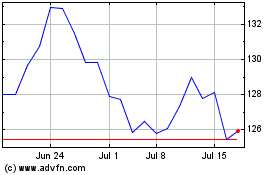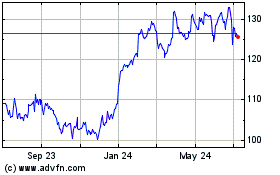Overheard -- WSJ
March 20 2019 - 3:02AM
Dow Jones News
By Charley Grant
This article is being republished as part of our daily
reproduction of WSJ.com articles that also appeared in the U.S.
print edition of The Wall Street Journal (March 20, 2019).
In a nearly 200-page presentation calling for investors to
reject Bristol-Myers Squibb's proposed acquisition of Celgene
released on Monday, activist hedge fund Starboard Value called
Celgene's pipeline of new drugs "unproven." The hedge fund said
relying on that pipeline "adds incredible risk" for Bristol-Myers
and could force additional acquisitions in the future. One example
Starboard cited is Merck & Co.'s $41.1 billion deal for
Schering-Plough back in 2009.
Don't tell that to Merck's shareholders. The company acquired
the cancer drug Keytruda as part of that deal and, while it wasn't
on most people's radar back then, things have most certainly
changed: Since the drug reached the market in 2014, Keytruda sales
have topped $13 billion. Wall Street analysts expect another $87
billion in cumulative sales through 2024, according to FactSet.
Given that history, Bristol-Myers shareholders ought to hope the
Celgene deal is similarly unwise.
Corrections & Amplifications Merck & Co. acquired
Schering-Plough for $41.1 billion in 2009. An earlier version of
the article incorrectly said the purchase price was $47 billion.
(March 19, 2019)
Write to Charley Grant at charles.grant@wsj.com
(END) Dow Jones Newswires
March 20, 2019 02:47 ET (06:47 GMT)
Copyright (c) 2019 Dow Jones & Company, Inc.
Merck (NYSE:MRK)
Historical Stock Chart
From Mar 2024 to Apr 2024

Merck (NYSE:MRK)
Historical Stock Chart
From Apr 2023 to Apr 2024
